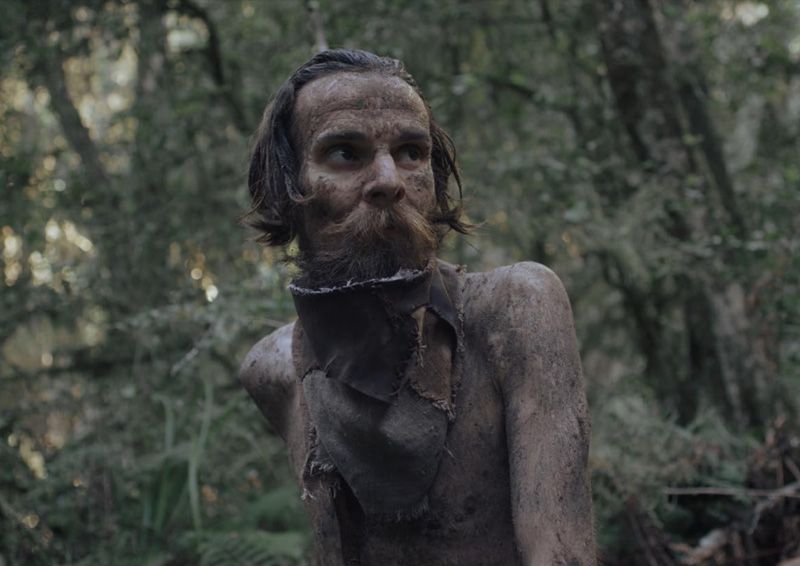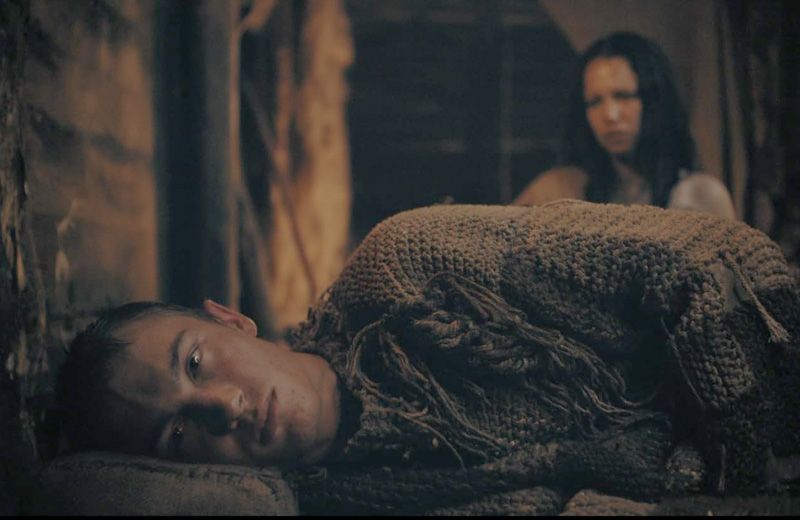I never watched The Last of Us because I’m afraid of Pedro Pascal’s nose, but it seems to me that Gaia (2021) could be a prequel to the HBO series.
Gaia is about South African versions of Gemma Arterton and Harold Perrineau, who work as forest rangers. They run into South African versions of Eminem and Lukas Haas, who work as servants of a fungus god.

Gaia and Gals
Gaia stars Monique Rockman, Carel Nel, Alex van Dyk, and Anthony Oseyemi. You likely don’t know them, although Nel starred in Raised By Wolves. Jaco Bouwer directed Gaia, and Tertius Kapp wrote it. A person probably doesn’t recognize them either, unless one is a connoisseur of South African entertainment. All I know of such things is Neill Blomkamp and Die Antwoord.
Speaking of which, I talked to a guy who said he stood next to Die Antwoord in Subway once. This story proves little, beyond the fact that no matter how many deals with Satan a celebrity makes, they will still find themselves collaborating with pimply-faced sandwich artists for their daily bread.
You think a celebrity ever goes into Subway and accidentally says, “I’ll take a six-year-old on Italian herb. I mean, a six-inch boy on Italian herb, I mean, a six-inch rotisserie chicken on Italian herb!”

Wise Gaia
But I digress, despite the lack of name-brand talent, Gaia is a fairly effective Lovecraft/ecological horror…at least up to a point. It can’t close the deal, but it sets up an intriguing premise.
Rockman and Oseyemi begin the film in a rowboat. Oseyemi enjoys Dijon mustard, which makes him a three-dimensional character worth caring about. Well done, screenwriter.
Rockman, meanwhile, pilots a drone. The drone comes upon Nel in the forest. Nel has clearly gone native, judging by his loincloth and mud-shirt. Nel clobbers the drone, which leads to Rockman having the brilliant idea to separate from Oseyemi to retrieve said drone.
I don’t know about any of you, but if I was piloting a drone that got smacked by a mud man carrying a bow, I’d abandon that drone as fast as Robert Caryle abandoned his wife in 28 Weeks Later. That drone belongs to the taxpayers. If they want it back, they can go get it.
Rockman doesn’t get very far before she triggers a Rambo trap that perforates her foot. Continuing to display uncanny decision-making, she decides to rest up in a creepy cabin. Never mind that the owner of that cabin probably set the foot-perforating trap in the first place.
It turns out that Nel is a former plant pathologist, who decided to live in the woods with his son (van Dyk) after meeting “god.” Nel and van Dyk take Rockman in, and they form a makeshift family, nurture each other, grow in their well-adjusted faith, and live happily ever after.
Just kidding. It goes horribly wrong for all of them.

Hey Gaia
Gaia is a slow-burn, quiet film. One thing in its favor is that it is not overly vague. The viewer gets a pretty clear idea of what is happening without the movie bogging down too much in explanations. Things work okay through the first two acts, but once the third act arrives, Gaia can’t keep its plates spinning. The characters start going in circles, and things get frayed.
One eventually begins to suspect Gaia’s creators aren’t exactly sure where they are going with the story. This suspicion solidifies when Gaia resorts to dreams and visions to fill time. It also makes Rockman take her shirt off whenever possible as another distraction.
This isn’t necessarily a mark against the creativity of those involved with Gaia. It might be a resource thing. They don’t seem to be working with a lot of Rands. Hence, they make the standard compromise: if you can’t be epic, try to fool the audience into thinking you’re artistic.
One Of The Gaia
This is where Gaia loses it. Instead of going out with a bang, it becomes a retelling of the story of Abraham and Isaac from the Bible, proving once again that filmmakers don’t know what to do with the Bible, other than proof-text it. Proof texting is taking random verses that don’t mean what filmmakers think they mean to make their story sound intelligent.
For example, Nel goes on a rant about humanity and sprinkles it with Bible verses, even though his religion has nothing to do with Christianity. Christianity is about Christ dying to redeem mankind. Gaia is about fungus apocalypse. Yet, the filmmakers are clearly trying to draw a parallel. They would have been better off by having Gaia say that environmentalism is a religion unto itself.
The word Gaia is from Greek mythology. It is a concept that makes Earth a god — the mother and sustainer of all life. Gaia worship has become more popular in recent years, and one could say that environmentalism is Gaia worship of a sort. Environmentalism likes to present itself as scientific, but it has components to it that are “faith-based” science, as well.
What is “faith-based” science? Science is generally understood to be observable, testable, and repeatable. Science that is not observable, testable, and repeatable requires an element of faith, or assumption, on the part of its adherents.
In unbeliever parlance, this is known as being a “sheep.”

Seeya Gaia
Going that route, Gaia could have had a punchline. Have Nel bring his electric car, wind turbine, and grasshopper entree to appease his fungus god. Then have the fungus god request the biomass of his son, as well. In return, fungus god promises to stop global warming. Nel obliges and finds none of these sacrifices have any appreciable effect on the weather. Winter arrives, and the fungus god freezes to death. Nel is left shivering in a crisis of faith.
As things stand, all we get is a bunch of malarky about love, Nel dry-humping the earth, and a lot of whatever. Eventually, Gaia finishes off with an outro that could lead into The Last of Us. It’s not a total waste. The film is nicely shot. It has a spooky tone. Most of it looks practical. The performers are believable. It doesn’t overstay its welcome. Yet, its commentary on religion comes off as quaint because it doesn’t have the awareness to realize politics are the new religion and social causes are the new cults.







